Who Can Beat Donald Trump
9 2020
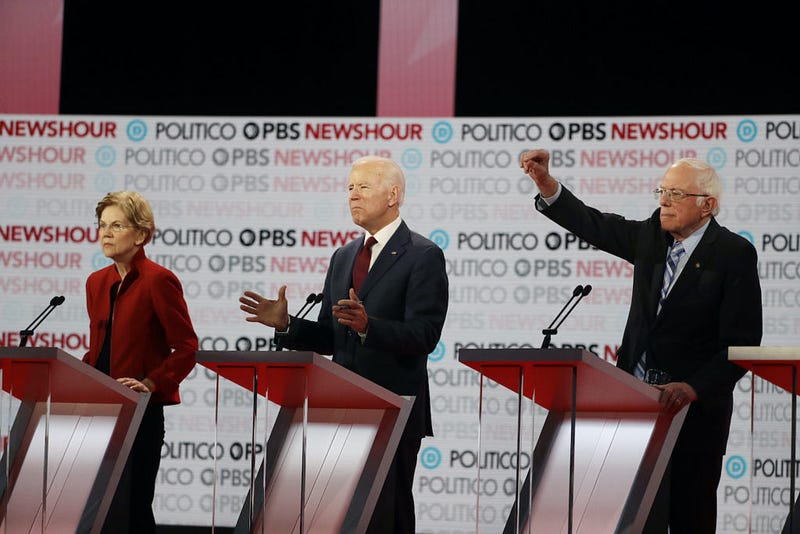
When looking at the 2020 candidates for the Democratic nomination, you might already know whom you want to support, based on your ideals. If not, I created a “potentially sane” guide for progressives that meticulously compares the candidates on issues, records, promises, and ethics.
But putting aside our ideals for a minute, which candidate is best positioned to actually win a general election against Donald Trump?
To answer this important question, I researched the general elections we’ve had so far in this century. Based on my findings, I assess each candidate below with a percentage chance of beating Trump in November.
If you’re in a hurry, you can skip the research and explanation of my criteria, and go straight to the assessments of the candidates.
HOW TO DETERMINE ELECTABILITY IN 2020
If you’ve paid a nonzero amount of attention to presidential races, you know there’s this thing called the Electoral College that ensures only a handful of “swing states” determine the winner. In essence, states rather than people vote, and since we already know today how 44 or so of the 50 states will vote based on a preponderance of voters of one or the other party, we really only have to look closely at a half-dozen or so “swing states” to know who will win the whole race.
As far as swing states go in 2020, based on current demographic trends, it’s Wisconsin, Michigan, Pennsylvania, Florida, North Carolina, and Minnesota that will be the most momentous of these “undecided” states. What’s going on in these states? Well, the crux of it is this: roughly one-third of the voters in swing states are registered Democrats; one-third are registered Republicans; and the other third are independents who often don’t vote. Let me say that again, a third of voters in swing states are independents, and they often don’t vote. Basically, any candidate will get their party’s faithful third of the electorate. The question is: Who gets more independents off the couch to vote? That’s who wins.
The Electoral College isn’t quite the whole story, though. Voters outside of swing states do matter in presidential races. Several important things carry across state lines: Money, Movements, and Enthusiasm. To wit, just because in 2008 I lived in California, a “blue” state that was surely going for Obama, didn’t mean that I had no impact on that race. I donated money to the campaign, I wrote to friends and family about the movement to elect Obama, and I cared enough to travel to Nevada to knock on doors and convince voters to support Obama.
So if you combine an awareness of the Electoral College, research into independent voter statistics, and an assessment of each candidate’s ability to generate money, enthusiasm, and a political movement, you get a pretty good pragmatist’s sense of how strong a candidate will be in a presidential election.
More succinctly: To win a presidential election, you need to inspire independents in swing states, and to do that you need at least three (and ideally four) of the following:
- Money
- Enthusiasm
- A movement behind you
- Strong cross-party and independent-voter appeal
So have recent Democratic candidates had three or four of these things?
I looked at all the elections of this century, but let’s start with 2008. The nominee on the Democratic side was Barack Obama, and, yes, he had these things, all four of them. When election day 2008 arrived, Obama took way more independents than did his opponent, John McCain; the majority of jaded, struggling, and not-committed-to-any-party voters in swing states were inspired by Obama’s “Hope and Change” message and the possibility of electing a Black president. He called for transformational change in the country, delivered eloquent speeches that generated enthusiasm, and appealed across party lines and to independents. Voters of all persuasions showed up in droves and swept Obama to victory. Four years later, in 2012, it was a much closer election; many independents had become disillusioned with Obama by that time, and the enthusiasm had waned as his policies and appointees proved largely disappointing, the wars continued, Wall Street was bailed out, and a recession robbed millions of people of their homes or livelihoods. But Obamacare was seen as helpful to many and his halo as an historic figure was enough to put him over the top for reelection.
In 2016, with independent voters everywhere disillusioned, hurting after the long recession, and struggling with the rising costs of basic living expenses, Hillary Clinton ran a status quo campaign. Trump, on the other hand, actually spoke to the prevailing issues of the day—yawning wealth inequality, jobs vanishing overseas, and diminishing opportunities for the working class — and he won more independents. Hillary’s establishment campaign was so unappealing after the disappointments of the Obama years that many independents and even some Democrats actually took a chance on a clearly corrupt, generally dishonest, manipulative former game show host because at least he promised to shake things up.
It’s important to note that in these races, identity played a role, but not a deciding role. Obama was, on balance, helped by the fact that he was Black, but it didn’t carry the day — his messages of change were more important in inspiring independent voters in swing states. Had Obama campaigned on a bland, uninspiring status quo message he wouldn’t have won. Clinton was, on balance, helped by the fact that she was a woman, and many rallied to her side because of her gender, but it didn’t carry the day — her message was uninspiring and offered nothing, famously declaring, for instance, that Medicare for All “will never ever come to pass.”
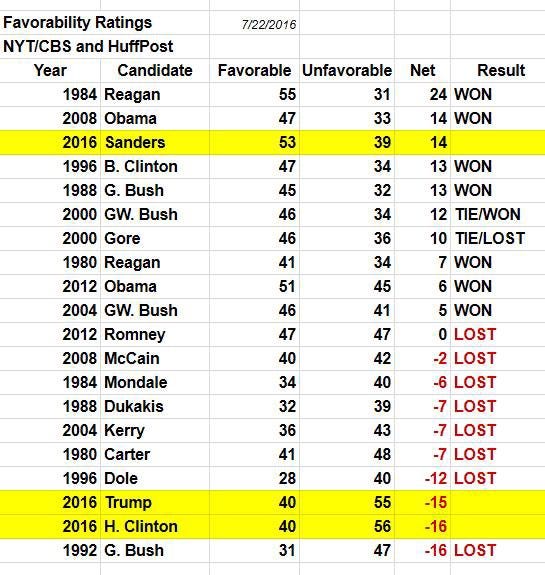
That 2016 race was ugly, contested by two historically disliked and distrusted candidates, and it was very close. While Trump did (barely) convince more independents in swing states, Hillary narrowly won the overall popular vote with her landslides in the West and Northeast. But in the Electoral College, states vote rather than people, and she was too weak a candidate to inspire enough independents in swing states. This was not because of Russian bogeymen, recalcitrant racism, or overarching sexism but because the only real change she promised was that it would be a woman instead of a man carrying out status quo policies in the White House, and this just wasn’t enough to inspire people living paycheck to paycheck who are too poor to see a doctor or handle an automotive emergency. They stayed home.
So here we are in 2020. The issues from 2016 remain and are only more pronounced. Make no mistake, Trump will be difficult to beat: He’s grown popular on the right, and he’s seen as a maverick by some independent voters as well.
If the Democrats want to win this critical race, pragmatically, they need their very best candidate out there, the one who appeals most to independent voters, who inspires enthusiasm, and who is building a movement. If they run a status quo centrist or a corporate-funded warmonger, Trump will again be able to position himself as the populist, the outsider, the one fighting for the little man, and he’ll likely win. He’ll run circles around a centrist — to the right on social issues and to the left on economic issues, and this is a winning combination today. This is what happened in 2016, and nothing has changed except that Trump is stronger as an incumbent and the Democrats are weaker as a party having done nothing for everyday people but chase conspiracy theories about Russia and Ukraine.
It isn’t absolutely certain that Trump would defeat a centrist Democrat, but a simple examination of history and presidential elections reveals it to be likely.
Before we assess the 2020 candidates on their ability to defeat Donald Trump, let’s review each election of this century:
- 2000 — Al Gore: Ran as a status quo centrist on Clinton’s legacy. Had money and establishment support, but no movement and scant enthusiasm. Lost.
- 2004 — John Kerry: Ran as a status quo centrist. Had money, but no movement and scant enthusiasm. Lost.
- 2008 — Barack Obama. Ran on sweeping promises of “Change and Hope,” inspired a movement to rewrite the history of the country by electing a Black president, gave eloquent speeches that promised progressive economic policy and ending wars, and generated enthusiasm that appealed to independents. Won.
- 2012 — Barack Obama. The movement had waned as his policies turned out disappointing to many, but the halo remained, and winning reelection isn’t as hard. Won.
- 2016 — Hillary Clinton. Ran as a status quo centrist on Obama’s diminishing legacy. Had money and the appeal of electing the first woman president, but little enthusiasm, no real movement, and no cross-party appeal. Lost.
Yes, only Obama, who ran as an unapologetic movement candidate and promised real systemic change, has won as a Democrat in this century.
ASSESSING THE 2020 CANDIDATES
Now then, let’s assess each candidate’s likelihood of defeating Donald Trump in November. As described above, I will use the following criteria which I believe to be most important in winning a general election:
- Money
- Enthusiasm
- Movement behind you
- Cross-spectrum appeal
I will consider three more indicators I think are very useful:
5. Polling
6. Establishment support
7. Intangibles/Debate strength
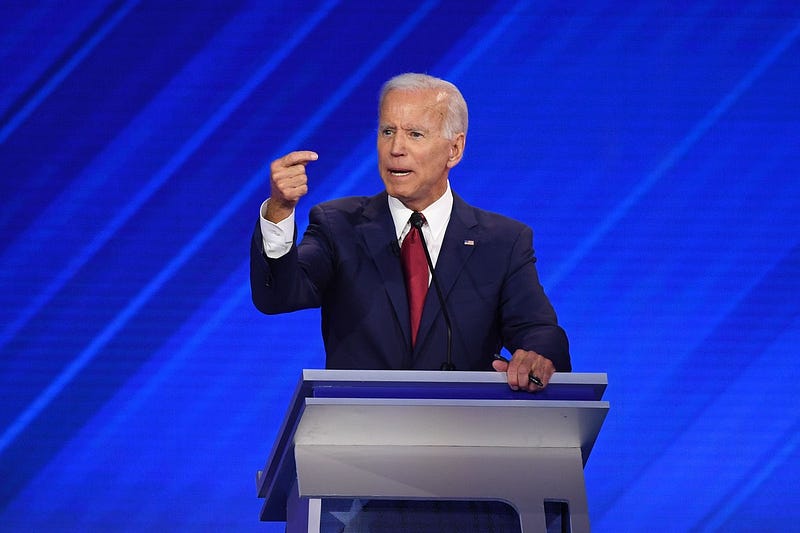
JOE BIDEN
Chance of winning: 35%
- Money: YES. Biden has fared decently well with fundraising, but nothing exceptional and less prodigious than Hillary Clinton. Also, as mentioned in the “Possibly Sane” guide, Biden is raising almost entirely corporate and PAC money, which exposes him to attacks as corrupt, attacks that will surely come from Trump if Biden is the nominee. How do you call out the Republicans as in the pocket of big corporations if you’re yourself in the pocket of the same corporations?
- Enthusiasm: NO. Thinly attended rallies; no cultural buzz; negligible social media presence. A puny 8% excitement level among even his own voters in a recent poll.
- Movement: NO. His calling card is “a return to normalcy,” a nostalgia for 2012 or something, which appeals only to those who were doing well during the Obama years and who liked the direction of the country at that time. This gives him, at best, the wealthier part of Clinton’s voters and a handful of affluent Republicans who dislike Trump.
- Cross-spectrum appeal: NO. His “moderate” (ie conservative) stances and record on Wall Street, regime-change wars, climate change, criminal justice, etc. will provide some comfort to Republicans, but as a longtime Democrat with the whiff of corruption and philandering about him, this appeal is negligible. He’ll get all the votes of the Democratic base and little more. His suggestion he might take a Republican as a vice presidential nominee is a red light here and indicates his strategy will be to go to the right to get more votes, a strategy Hillary tried as well, with generally poor results.
- Polling: MAYBE. Polls do show him beating Trump head-to-head, outside the margin of error. But his numbers have been going down, and as it is he’s barely winning.
- Establishment: YES. Believe it or not, Biden has been in DC so long he first ran for president 30 years ago. It didn’t go well, but nevertheless this is his greatest strength. And yet in this anti-establishment climate, it’s arguable whether this is a net positive, and even if it is, his support in the media and DNC are not quite as rock solid as Hillary’s were. This, more than any other indicator, shows that even Biden’s strengths might become vulnerabilities in a general election.
- Intangibles/Debate strength: NO. It’s painfully apparent that Biden can barely put two sentences together without stumbling, angrily bellowing at people to “go vote for Trump then,” or strangely admitting to voters that Obamacare was a lie, or spluttering something about “punching away” on domestic violence. A Biden who speaks least speaks best.
General Election Preview:
- Trump will go after Biden hard on corruption, and he’ll land some blows. Biden will struggle to win debates about “values.” Biden has shown time and again that when confronted about his son’s plum position in Ukraine, for instance, he gets angry. He knows these questions are coming and yet he still isn’t prepared and can’t decide what to say. He will answer some questions well, but on these issues he will come across as both guilty and confused, and in general it’s hard to imagine Biden holding up in a one-on-one debate against Trump.
- Trump and the Republicans will launch “corrupt Joe” attacks immediately during this upcoming ill-advised impeachment trial in the Senate. Mark my words: Biden will come out more tarnished than Trump from the Senate impeachment trial.
- Biden will struggle to win over voters on “issues” or “policy” since he has so few appealing promises to make.
- Trump may also “punch below the belt” and allude to Biden’s penchant for groping and sniffing women. Trump won’t try to appear to be “better,” just to muddy the “values” battle Biden would have to win to appeal to independents.
- In his best moments, Biden will run as Hillary Clinton 2.0. He’ll make clear calls for more inclusive language to reduce racism and sexism across the country, and he’ll speak out about climate change and wealth inequality.
- Of course we know how Hillary 1.0 went, and Biden doesn’t have even her proficiency in oratory or campaigning. Obama, who is a fabulous speaker, would campaign to help Biden, but judging by Obama’s comments it will be with less enthusiasm, and in any event he campaigned up and down for Hillary to little real effect.
- What we saw in 2016 was that independents and working class voters just aren’t looking to return to 2012. Rising prices, falling wages, secret trade negotiations, home foreclosures, and the ongoing wars in Iraq and Afghanistan revealed at that time that the Obama presidency was never truly about hope or change but rather about helping the wealthy get wealthier. Independent voters in swing states don’t want a return to that.
- Simply put, this proposition — continuing the Obama years — has literally already lost. And Hillary was a better, more intelligent, more coherent politician. She also had the appeal of electing a woman, which generated some real movement energy behind her. While he doesn’t carry all the scandals and baggage that Hillary did, Biden’s record on such obvious things as the Iraq War, mass incarceration, and Wall Street regulation is so bad for progressives and independents that there is no guarantee whatsoever he’ll do any better in consolidating the left behind him or appealing to independents. A Biden candidacy likely won’t be even as strong as Hillary’s and look a lot more like John Kerry’s or Bob Dole’s — old establishment hands who “deserved their turn,” when in fact no one outside the beltway had any interest in them or their perspective.
LIKELY OUTCOME: Biden loses to Trump.
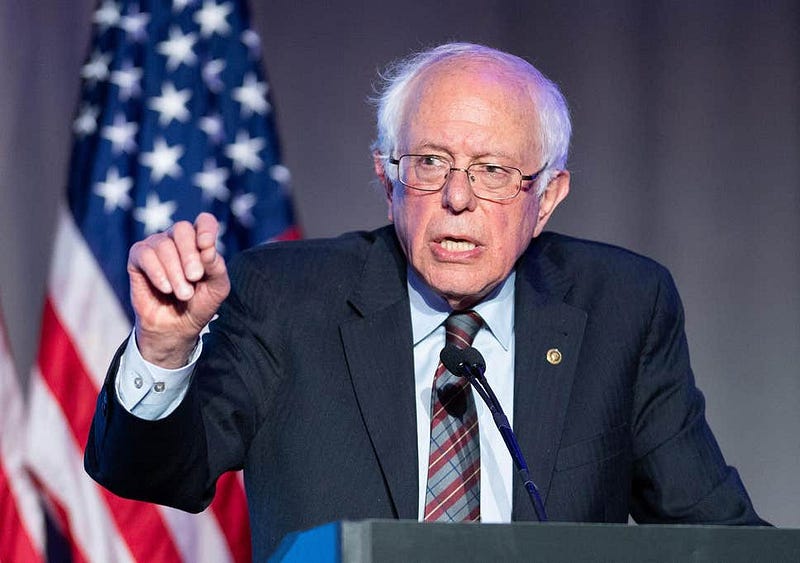
BERNIE SANDERS
Chance of winning: 70%
- Money: YES. As mentioned before, Bernie is not only outraising the rest of the Democratic field currently but he resides in a class by himself when it comes to fundraising from small donors. He’s a groundbreaking candidate when it comes to fundraising, and it both enables his revolutionary campaign to continue and accentuates his reputation as honest and uncorruptible. It is possible that on this issue of honesty alone he would have won in 2016.
- Enthusiasm: YES. As with so many of these metrics, this one is night and day when compared to Biden. While Biden’s public events are few and sparsely attended, Bernie is building momentum and filling stadiums and auditoriums, and not just in California and New York, but in places like Minnesota, Indiana, and Kentucky. You wouldn’t know it because of the Bernie Blackout in the media, which has been documented again and again (and again), but Sanders generates overflow crowds at his rallies, even when they’re hosted in venues no one else in the race could fill. He’s the most popular politician in the country by many measures, and of course politics is a popularity contest. He’s also now the candidate most popular with both younger voters and voters of color, which makes him the ideal candidate to rapidly increase his support after the primary and build a large base of independents for the general election.
- Movement: YES. This is perhaps the most important thing to understand here. Movement candidates win. Movement candidates get stronger, not weaker, as time goes along. Movement candidates build the kind of momentum that snowballs and builds more momentum. Obama was a movement candidate. Trump himself is a movement candidate, even if parts of his movement were fake — he promised economic change, to make “America Great Again,” and to address the corruption in Washington — and his movement caught on because so many people are in such desperate straits right now that they were willing to take a chance on a shifty, racist, bullying game show host. Bernie’s movement is genuine and still growing, and it is perhaps the only thing on the political scene right now that can overwhelm and defeat Trump in 2020.
- Cross-spectrum appeal: YES. Did I mention Bernie is the most popular candidate among people of color? Think about that. If you’ve ever heard, let alone used, the slur “bernie bro,” now we know once and for all it’s not only lazy and disingenuous and erases women and people of color, but it’s another deliberate lie by corporate media hacks who fear him. Bernie’s bold progressive ideas already appeal to wide swaths of the population, and they will likely grow in popularity as they’re more widely discussed. He’s the Democrat best positioned to win the independent working class voters that put Trump over the top in swing states in 2016. Where Trump offers fake promises to help poor people, Bernie offers real promises that will help poor people. Tuition-free college, Medicare for All, and cancelling student debt will increase in popularity across the country as more learn about them and really contemplate how these policies would positively affect their lives. Simply put, Bernie is the only candidate who takes independents away from Trump.
- Polling: YES. Polls show him beating Trump head-to-head, outside the margin of error, as they did throughout 2015 and 2016. His margin in the polls are not as large as they were in 2016, but they have been going up, and throughout his career Bernie has outperformed polls because of his popularity with young people who are polled less frequently.
- Establishment: NO. This is Bernie’s greatest weakness, although in this political anti-establishment climate, it’s probably a net positive. The issue remains: The DNC and corporate media are Bernie’s foremost adversaries, and this primary will likely be harder for Bernie to win than the general election. Will the media cover Bernie this time? Will the DNC rig the debates and voter rolls as they did in 2016? Will Obama back up his promise to actually attack Sanders if he’s “running away with the nomination”? We will see. If Sanders can get some support in the DNC from leaders who actually want to win, and some positive press in the Democrat corporate media (NYT, NPR, MSNBC), Bernie likely wins both elections in 2020.
- Intangibles/Debate strength: MAYBE. He hasn’t shone in the debates this year as he did in 2016, and it’s not clear he’ll have a charisma edge over Trump. On the other hand, by many measures he won the December debate, and his simple language, longtime consistency, and straight talk, coupled with genuine thought-out progressive policies that will help everyday people, will likely be kryptonite to Trump’s bombastic false promises on stage.
General Election Preview:
- Trump will go after Bernie as a socialist and a communist, as Republicans always do regardless of a Democrat’s actual policies. These attacks have been losing their venom of late, however, and “socialist” is not only no longer a dirty word in American politics but has increasing appeal for many Democrats and independent voters.
- Bernie’s positions on global trade deals and his overall appeal to working class voters will neutralize Trump’s main attack on Democrats, making the election primarily a referendum on cultural values and trust.
- The number of people willing to vote for an “independent” “democratic socialist,” when given the chance, will prove far higher than the media suggests. Bernie has been attacked as a socialist for his entire 40-year career, again and again, and it has never stopped him. He has always outperformed media expectations and polls, and 2020 will be no different.
- The corporate media will give more coverage to Trump and his criticisms of Sanders’ “wild ideas,” and this will provide a real advantage to Trump’s image.
- There will be no new scandals or dirt about Bernie. By all indicators everything negative — everything in the “playbook,” according to Peter Daou — against Bernie was already used by the Clinton campaign in 2016.
- A war or terrorist event of some type will be used by the Trump campaign to question Bernie’s patriotism and “toughness,” and this will help Trump — but not quite as much as it would against a less principled opponent.
- Bernie will win more independent voters than Trump. Trump won the 2016 election because huge swaths of the population find our current economic system dysfunctional to the point of creating millions of “wage slaves,” “healthcare bankruptcies”, and actual homeless. Bernie will take away many of these voters from Trump as those who listened to Trump’s anti-establishment message in 2016 will be willing to listen to Bernie and his bold promises of change in 2020.
- Fighting fire with fire will work. Real populism will outshine fake populism. Bernie has an actual track record of true populist progressive victories, so he will be able to go after Trump strongly by offering genuine bold promises where Trump offers only empty populist-sounding talk.
- Trump will go after “crazy Bernie” for his wacky ideas, and yet Bernie’s top strength will shine through: his longtime consistency. Bernie’s great record on things like the Iraq War, gay rights, civil rights, and healthcare will set him apart from Trump. Indeed Bernie’s record will appear finally to be far less “crazy” than Trump’s.
- Bernie won’t waffle or apologize and will stand for what he stands for. This will help continue the growth of his momentum and movement in 2020.
- Trump will struggle to find a coherent message. Potentially reflecting unease with running against Sanders, Trump has quietly acknowledged socialism “could be hard to beat.” He also recently inquired about forgiving student debt before being told no in strident terms by Betsy De Vos (the De Vos family’s main vehicle for amassing wealth has been student debt, in particular the way student debt survives even after bankruptcy). Trump actually appears to fear running against Bernie, whereas he seems to relish running against Biden.
- Bernie will get not just the Democratic base and the virtual entirety of the left but a significant portion of the independents Trump relies on as well. It will be a fascinating and epic battle, but with his record, movement, and character, Bernie is better positioned to win.
LIKELY OUTCOME: Bernie beats Trump.
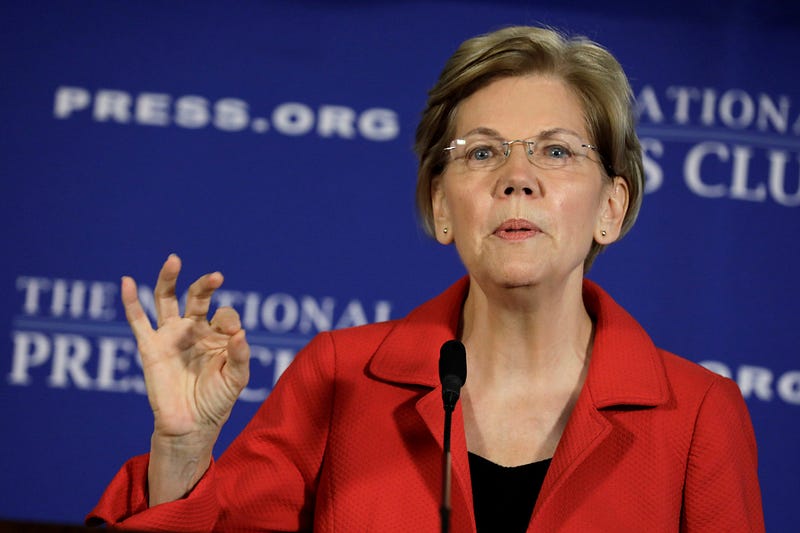
ELIZABETH WARREN
Chance of winning: 40%
- Money: MAYBE. Warren has done well enough, fundraising nearly as well as Bernie — and better than Biden or pre-wine-cave Buttigieg. But her last quarter’s haul was down. She also transferred her partly PAC-funded Senate campaign funds into her presidential fund, and then she waffled on accepting PAC money in the general election, so she will not have the high road here against Trump.
- Enthusiasm: YES. She has generated enthusiasm in many places across the country, comfortably stronger than Biden or Buttigieg but without really rivaling the movement-based support Bernie gets when campaigning. She has broadened her appeal but still struggles to attract people of color and the lower-income working class voters that Trump relies on for his support. While affluent educated white people do have a lot of clout in this country, this bloc isn’t quite enough to win it all in 2020.
- Movement: MAYBE. She would be running to become the first woman president against Donald Trump, and this will be significant and inspiring to many. It is conceivable that were she to commit more heartily and fully to the progressive ideas she espouses she would find a whole movement surging behind her to propel her into office. But with her instincts on things like Medicare for All looking so shaky lately, it is unclear whether this would materialize.
- Cross-spectrum appeal: NO. Her lefty progressive economic plans do have widening support, but she’s walked back some of her boldest ideas. Furthermore, she’s the most all-in on the identity politics and lefter-than-thou social issues that don’t have much cross-spectrum or independent appeal. Rather than the old “socially liberal, fiscally conservative” calling card of neoliberal Dems, today it is “socially (slightly) conservative, fiscally (very) progressive” that appears to be the winning recipe.
- Polling: NO. Polls are notoriously unreliable at this point, but Warren is losing to Trump in slightly more of the latest polls, although many are within the margin of error.
- Establishment: MAYBE. One of the big questions of the primary so far has been Warren’s establishment support within the DNC. She certainly rails against the billionaire class in language similar to Bernie’s and decries the “rigged financial system.” She even uses the word “corruption,” which used to be off-limits and which no doubt describes what infests the brass of the party. Yet she never endorsed Bernie in 2016, she’s walked back her Medicare for All promises, and she seems to water down just enough of her progressive promises that it seems possible she’s positioning herself as a “Stop Bernie” half-progressive establishment candidate who will speak for everyone but fight for no one. It’s hard to tell, but as laid out in this brilliant guide for progressives choosing between Sanders and Warren, Warren is likely to have more establishment backing but generate less of a movement behind her.
- Intangibles/Debate strength: NO. Her indirect way of speaking and wonky-at-times professor persona need to improve substantially for her to go toe-to-toe with Trump on a debate stage. She needs to be both clear and fiery, yet both attributes seem a stretch for her. She’s obviously most comfortable thinking through ideas, as she did as a professor, and then writing up a plan and explaining its details and policy minutiae to all who will listen, but doing so will simply sound like obfuscation and double-speak to voters uncertain about her intent.
General Election Preview:
- Warren will campaign as a genuine progressive, forcefully call out corruption, and promote genuine progressive policies which will throw water on Trump’s faux populism.
- Trump will go after Warren aggressively on her white lies about her Native American heritage and career as a teacher, and likely throw her off her game in debates. In truth, thus far while campaigning, Warren has seemed a bit fragile when confronted by unexpected questions or minor moments of opposition. Trump will pull no punches, and we haven’t seen Warren in this kind of a dialogue. She has resisted going on FOX or speaking in other challenging venues. Sure, she’s impressive when grilling banking executives in congress, but those hearings aren’t debates and the executive usually just has to sit and listen.
- “Pocahontas” is only the first of many attacks that will come her way, and Warren has never really owned up to her use of this dubious extraction so she will be vulnerable here.
- One of Warren’s big challenges will be the tight-rope-walk of “progressive enough to get the left; establishment enough to win older affluent whites.” She is clearly a fine politician and there is ample reason to believe she would be able pull this off.
- Warren will have the advantage of being a woman in a party and country that are ready to elect a woman president, and the media will celebrate this, giving her a real foothold from which to attack Trump.
- More than any other candidate still in the race, Warren is all-in on the liberal social policies, identity politics, and virtue signaling that have become so divisive nationally. There will be some 2020 version of the transgender-bathrooms brouhaha of 2016 that will likely turn off half the country, and it’s likely Warren will take a position that will please liberals but will make cross-spectrum appeal difficult.
LIKELY OUTCOME: Warren loses to Trump.
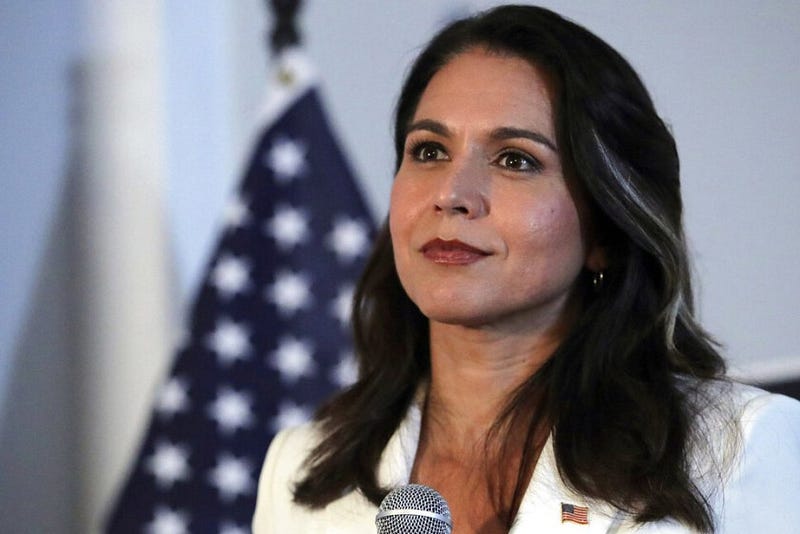
TULSI GABBARD
Chance of winning: 55%
- Money: NO. Tulsi has done remarkably well, with a $3.8 million haul in Q4, but she hasn’t quite broken through to the level she needs to challenge for the lead in the primary or to run in the general election. This would quite likely change however were she to win the nomination and receive genuine media attention rather than the blackouts and smears she now receives.
- Enthusiasm: YES. Tulsi’s message of less war is far rarer than it should be. What has become of peace politics in this country? Probably because of this, Tulsi is generating admiration and enthusiasm in many voters, across the spectrum and deep into independent swaths of the electorate that are key to winning general elections. With the current climate of insanity around Iran, she will be the strongest, most principled voice against a war that will prove deeply unpopular if (God forbid) it is launched.
- Movement: MAYBE. When people know what you stand for and see it as crucial to their lives, they form a movement behind you. This is beginning to form around Tulsi with her message not only of peace but of a genuine progressive vision of the world and a more honest and heart-centered approach to the country’s problems. Because of her clear goals, fearless approach, and honest demeanor, a Tulsi movement has tremendous potential.
- Cross-spectrum appeal: YES. More than any other candidate — even Bernie — Tulsi strongly appeals to independents and Republicans as well as Democrats. Believe it or not, reducing the trillions spent on destroying the lives and lands of other nations has genuine and deep appeal to most humans living in this country who learn that it’s a possibility. In fact she gets rougher treatment on Democrat bubble media like MSNBC and NPRmthan she does on independent and Republican bubble media. To my mind, she is the candidate that would have the best chance of “uniting the country.”
- Polling: MAYBE. There have been few head-to-head polls for Tulsi, and they’ve been mixed, but honestly she’s not well-known enough yet for the polls to be meaningful.
- Establishment: NO. This is one of her greatest weaknesses and greatest strengths. To those who admire her courage and principles, her decision to resign from her “rising star” status in the DNC and endorse the less bellicose candidate (Bernie Sanders) in 2016 strengthens her overall appeal; to those who somehow believe the vicious and unfounded smears about her being a Russian agent, the fact that she’s running without the support of the DNC establishment is reason enough to oppose her. For open-minded progressives, on the other hand, those who saw the corruption in the DNC, it will be easy to support Tulsi. Nevertheless it must be said here that it will be difficult to run in the general election without the support of your own party’s leadership.
- Intangibles/Debate strength: YES. Tulsi has uncommonly good stage presence in the debates, both when delivering messages about her vision and when fearlessly attacking the shortcomings of her opponents. As a veteran and a woman, wielding this level of stage presence, she would be a formidable opponent to Trump, who himself is very good on the debate stage. She would hold her own in debates and likely draw stark distinctions between her many qualities and the flaws of Trump.
General Election Preview:
- This will be a fascinating race, pitting Tulsi’s genuine integrity against Trump’s transparently false showmanship. No other pairing would produce this level of contrast, of opposites, this clear of a yin-yang.
- Tulsi’s cross-spectrum appeal will expand from its current formidable state, and she will pose a real threat to Trump for even his own party’s votes. Democrat bubble media pundits say they really need someone who can appeal to Republicans, but when they actually see a candidate who does appeal to Republicans, they shriek that she must be a Russian agent or be out to ruin the Democratic Party. It’s obviously nonsense, but they’re too wedded to the military industrial complex and endless war to give a fair shot to someone who favors peace.
- Trump will attack Tulsi as a Hindu and as a woman, but with her legislative and military record, he will find some difficulty landing blows. Her principles and courage will be cut like a knife through his bombastic exaggerations and demagoguery.
- Tulsi’s popularity and approval will skyrocket as people get to know her beyond the lens of corporate media. Like Bernie and Andrew Yang, Tulsi is an open and authentic person who people like more the more they get to know. Within weeks of becoming the nominee, she would be suddenly widely known and known in a far more genuine fashion.
- For instance, if you’re a musician, imagine having this couple in the white house.
- If you value personal growth, imagine voting for someone this authentic.
LIKELY OUTCOME: Toss-up!
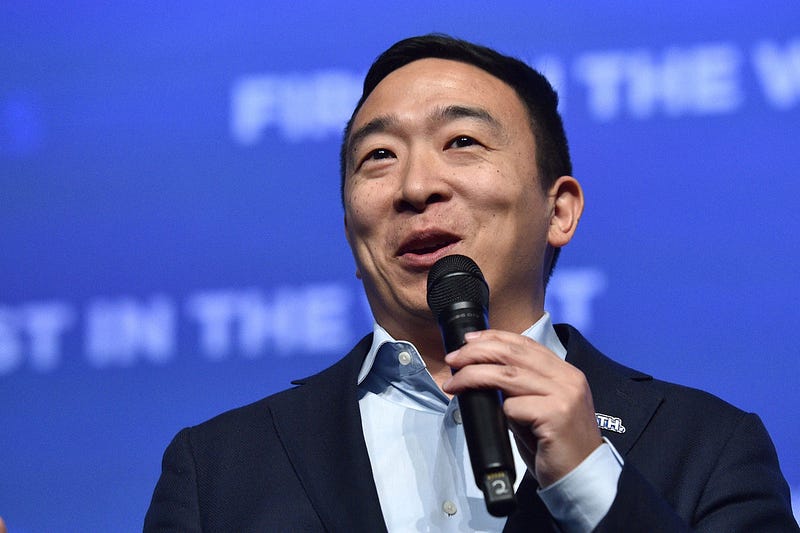
ANDREW YANG
Chance of winning: 45%
- Money: YES. Not least among the many surprises that Andrew Yang has sprung on this race is his ability to raise money. His fourth quarter 2019 haul of $16.5 million is legitimate and will enable him to compete in the primary for the foreseeable future. Furthermore, his money is individual donor-driven Bernie-style grassroots fundraising, rather than coming from PACs and billionaires, so he has that on his side as well.
- Enthusiasm: YES. There is a growing passion and force behind the Yang candidacy online and (increasingly) in rallies.
- Movement behind you: MAYBE. The “Yang Gang” has essentially evolved out of nothing, but it is starting to look like an incipient movement. Yang’s powerful idea — that automation (not immigrants) is what is taking working class Americans’ jobs, security, and standard of living — has caught on and changed the discussion in this primary. Universal Basic Income, an idea that was relatively esoteric as recently as 2018, has now been covered by all major media networks and discussed by all the presidential candidates. It could be that Yang’s ideas turn out to be persuasive enough to sweep the country by storm in 2020.
- Cross-spectrum appeal: YES. Yang and Bernie Sanders are the only candidates with double-digit appeal to 2016 Trump voters. There are polls showing Yang with more appeal to undecided and independent voters than any other Democratic nominee.
- Polling: MAYBE. Yang is still in single digits nationally in the race for the nomination, and unfortunately because of this there is simply not enough polling head-to-head against Trump to compose an average.
- Establishment: NO. Even less establishment than Bernie or Tulsi, Andrew Yang truly comes from a world of his own. This is undoubtedly a strength in this race. But the DNC brass barely knows him enough yet to oppose him, and make no mistake, they will not be enthusiastic to nominate him at the convention should nor to support him as the nominee should he somehow win enough delegates.
- Intangibles/Debate strength: YES. Yang is surprisingly comfortable, charismatic, eloquent, and persuasive on the stage and in media appearances. It has to be largely natural talent combined with inherent courage of conviction, which bodes will for a protracted campaign against suck a skilled showman as Trump.
General Election Preview:
- Yang will go right at Trump on ideas. His campaign motto— “MATH” — will shine as an excellent foil to “MAGA,” underscoring for all to see the differences between an empty platitude like “make America great again,” and an actually powerful idea, like Universal Basic Income.
- Trump will go after Yang as a “minor league” player, trying to pin him as unsuccessful in business and lacking in experience. These will not be easy punches to land, however, as Trump himself had at best mixed success as a businessman and no political experience.
- Trump may also launch thinly veiled racist attacks, calling Yang “the smartest kid in the class,” or a “know-it-all,” to evoke racist stereotypes of Asian Americans, or even stoke fears of the country of China itself.
- The DNC will potentially sit the race out, quietly, covertly, secretly preferring a Trump victory — something that they would know how to work with, complain about, and raise money against — to an unpredictable Yang victory that could turn their world of lobbyists and consultants upside down. Likewise, the DNC’s friendly media chums at the New York Times, MSNBC, and NPR would write less-than-enthusiastic pieces about Yang’s candidacy.
- Yang’s powerful ideas — that automation is changing the world and we need to respond immediately — might just prove as persuasive as Trump’s castigation of immigrants did in 2016, and we could see Yang retake Trump’s narrow victories with white working class voters in swing states Michigan, Ohio, and Pennsylvania. And that would be all it would take to win the election.
LIKELY OUTCOME: Toss-up!
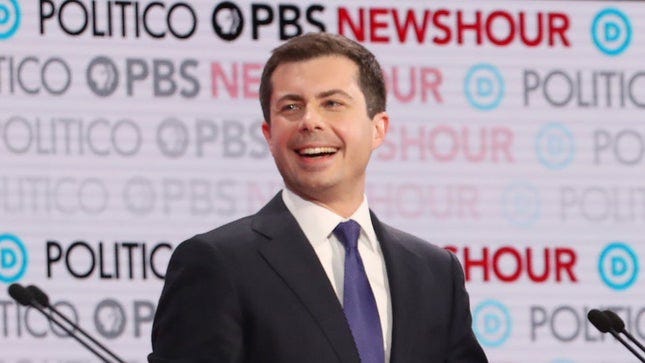
PETE BUTTIGIEG
Chance of winning: 20%
- Money: YES. Buttigieg has done very well raising money, particularly after sliding over to a more neoliberal, Wall Street-friendly position on issues like healthcare, college tuition, and student loan debt. Quite a bit of his money is corporate and PAC money coming from fundraisers like the famous wine cave event, so he’ll have trouble appealing as an honest populist in a way necessary to threaten Trump.
- Enthusiasm: NO. His appeal has remained limited primarily to affluent older white people. His zero appeal to people of color is a blinking red light; his lying to manufacture support from people of color is a double blinking red light; his firing, rehiring, and demoting South Bend’s black police chief is a triple blinking red light. Being Mayor of the small town of South Bend, IN, is his only record, and even there, despite promises to the contrary, virtually his entire staff were white. He polls under 5% with young people, which is particularly telling about his inability to connect, as he’s the youngest candidate in the race. It’s simply hard to see him going anywhere in a general election.
- Movement: NO. To build a movement, people have to know what you stand for and they have to see it as meaningful in their lives. Neither is evident with Buttigieg. As with so many corporate centrists, it’s difficult to tell why exactly he’s really running. What is his mission or message other than that he too wants to be president? We do know he wants to stop Bernie (whom he once lavishly praised as the leader we actually need). Most likely of all, he’s not running to win but rather to build his own name recognition for other ambitions.
- Cross-spectrum appeal: NO. We entered this era approximately five years ago where centrists no longer appeal to independent or young voters. Somewhere in Obama’s second term, a majority of independent and young voters stopped believing establishment politics did anything for them, and these days they support anti-establishment candidates. As mentioned above, independents comprise half the voters in swing states these days. With the young, it’s even more pronounced: a shocking 4 out 5 people under 35 want an anti-establishment candidate (Bernie, Tulsi, Warren, or Yang).
- Polling: NO. Polls aren’t very reliable at this point of course, but Buttigieg is currently losing to Trump, which does raise concerns about his potential against Trump, considering that the leading Democrats (Bernie and Biden) are faring better at this point.
- Establishment: YES. This is his greatest strength, although in this political anti-establishment climate, it’s arguable whether this will play out as a positive. Even if it does, his support in the media and DNC are not as rock solid as Hillary’s were.
- Intangibles/Debate strength: MAYBE. Buttigieg is certainly skilled as a speaker and a debater, and he comes across as informed and intelligent. But as the spotlight actually focused on him when he began to rise in the polls over the past month, we saw him in impromptu moments crack a bit, and the underlying picture wasn’t good. When directly asked about his closed-door fundraisers and lack of support among people of color, he snapped at people with responses that appeared both rude and smug. We would likely see more of this unattractive attitude over the course of a lengthy general election against Trump, and it isn’t promising.
General Election Preview:
- Buttigieg will attempt to appear “better” than Trump — a better human being, a better speaker, a better thinker, but it will fall flat or even come across as privileged to many. Trump will get in some digs here, as well, and this will enhance Trump’s strange ability to appear as an everyday guy when standing next to many politicians despite the fact he is as privileged and aloof as anyone.
- Buttigieg and the Democrat bubble media will present Mayor Pete as the “anti-Trump” — Trump’s polar opposite, the worldly Rhodes Scholar to Trump’s bullying buffoon, the speaker of many languages to Trump’s speaker of monosyllabic English. The problem is, that kind of opposite can’t beat Trump in 2020. That kind of opposite is actually who independent voters snubbed as elitist in 2016 and will snub again. Wide swaths of the electorate in fact now see the Democrats as the party of the wealthy elite (how times have changed), and to them part of Trump’s appeal is his straight-talking, no-holds-barred, common-man persona.
- Buttigieg will continue to struggle to lift off with people of color. His current, approximately nonexistent appeal to people of color will be a nonstarter in a general election where the Democrat has to turn out large numbers of people of color, particularly in urban areas of the midwest, to have any chance in taking the electoral college.
LIKELY OUTCOME: Buttigieg loses to Trump.
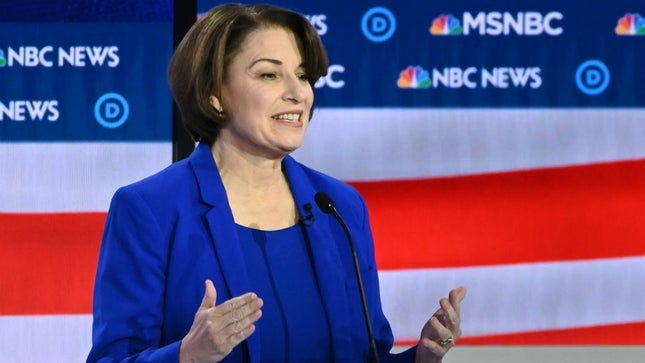
AMY KLOBUCHAR
Chance of winning: 15%
- Money: MAYBE. Well, despite all expectations to the contrary, Amy has not dropped out yet, so she has a chance. She could even be the next Establishment Media Flavor of the Month, now that Beto, Booker, Kamala, and Buttigieg have each had their turn and failed and faded. Which could mean buckets o bucks are coming her way along with lots of soft, sweet media pieces calling her “the Next Obama” and “the winning recipe.”
- Enthusiasm: NO. Didn’t she throw a binder at someone who was too enthusiastic?
- Movement: NO. Klobuchar is the anti-movement candidate. She is the tweak-it-a-bit moderate appealing to centrists and conservatives and older wealthy white people who are frankly quite concerned about “structural change.” Sure, she’s anti-Trump; she’s also “pro-civility,” whatever that means in a country with such yawning income and wealth inequality. You can’t build a movement with supporters who want nothing to change.
- Cross-spectrum appeal: NO. She’s been too partisan, too neoliberal, and too straightforward in her politics.
- Polling: MAYBE. Amy is still in single digits nationally in the race for the nomination, and thus there is simply not enough head-to-head polling data against Trump to compose an average.
- Establishment: YES. She’ll have the full weight of the DNC and their loyal media at the New York Times and MSNBC behind her, for what it’s worth.
- Intangibles/Debate strength: NO. She went after Buttigieg well in the December debate — let’s give her credit where it’s due — but her overall performances and her demeanor as a whole are generally not remarkable enough in any way. She comes across as very, very… adequate.
General Election Preview:
- Amy Klobuchar on the campaign trail will resemble Hillary Clinton, and she will perform almost as well, generate almost as much enthusiasm and build almost as significant a movement behind her. She won’t call anyone “deplorable,” and she won’t have to lie about her use of a private email server to accept bribes. She’ll be just a little bit better than all of that. Which is to say, she’ll do a more respectable job of losing, and (probably) won’t blame the Russians for her loss, which will leave the rest of us a little more sane as we endure four more years of Trump.
- She’ll enter the race with lower unfavorables than Hillary (but lower favorables, too). Here’s that chart again:

LIKELY OUTCOME: Klobuchar loses to Trump.
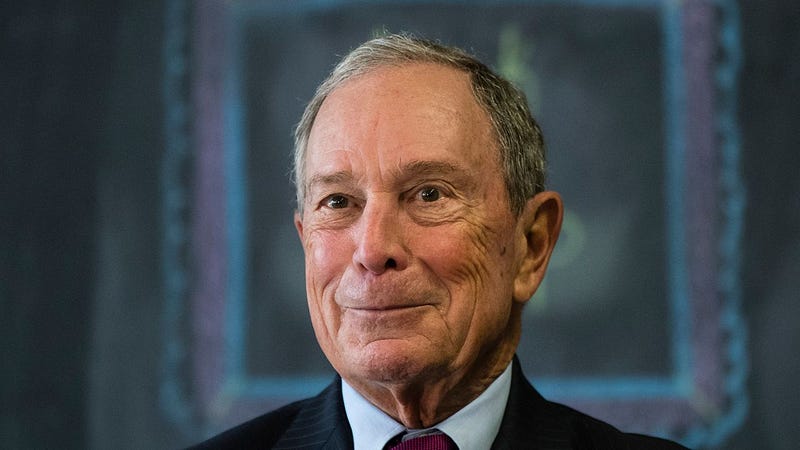
MICHAEL BLOOMBERG
Chance of winning: 25%
- Money: YES. Well, this he has in spades. He dropped an outrageous $100 million of his own money on TV ads upon entering the race and, sure enough, bought himself about 5% in national polls right off the bat, coming mostly at the expense of Buttigieg. With his media ownership and corrupt past, his candidacy evokes nothing if not the deeply troubling phenomenon of Silvio Berlusconi taking over Italian politics with his riches and his media empire. Is it legal (let alone ethical) for a candidate’s own media empire to cover his own race?
- Enthusiasm: NO. No grassroots here, move along, only astroturf as far as the eye can see. Ad-bought support leaves as quickly as it comes. Bloomberg even had to resort to prison labor to get people to phone bank for him (which is, let’s be honest, exploiting slavery in a modern context) while movement campaigns like Bernie’s and Warren’s attract enough volunteers for this.
- Movement: NO. He stands for… ? Stopping Bernie Sanders? Becoming president? Having a lot of money and spending a lot of money? Winning one for the billionaires?
- Cross-spectrum appeal: NO. He’ll hope to win the votes of some billionaires across the aisle and just might do it, which is not quite the same as winning rank-and-file Republicans or independents. Swing states will not go to Bloomberg.
- Polling: MAYBE. No real polls here yet.
- Establishment: YES. The DNC will happily support him if he pays them enough and seems likely to beat Trump — or at least to stop Bernie. The Democrat bubble media will write tortured articles about Bloomberg being “not ideal,” even “problematic,” and a “lesser evil,” but they’ll endorse him anyway and write generally positive pieces as he wanders out onto the battlefield to lose to Trump. He does have his own media empire, as we mentioned above, so he cannot be completely counted out here. There’s an outside chance all of this leads to billionaire B scoring an upset victory over billionaire A.
- Intangibles/Debate strength: NO. Haven’t seen anything here to believe he’ll be decent in debates. Oh right, he hasn’t qualified for the debates. Did I mention he dropped $100 million on TV ads over the course of two weeks? No one else had spent even $10 million yet, although by now Buttigieg has spent around $15 million. And Bloomberg has spent another $100 million.
General Election Preview:
- Bloomberg will struggle mightily to connect with voters, convince anyone about his policy ideas, or debate Trump.
- How do you feel about someone buying the presidency? Yep, that’s how most people will feel. While Democrat loyalists will certainly run out and pull levers for Blue No Matter Who, independents won’t vote for him. He’ll lose.
- Isn’t it illegal to own a major media organization reporting on your own candidacy to be president?
- How did Berlusconi and Italy work out?
- So many questions, so many answers, and none of them will make Bloomberg look good to financially struggling independent voters in swing states.
LIKELY OUTCOME: Bloomberg loses to Trump.
At the end of the day, if you’re an idealistic voter, you’re in luck. There’s little doubt the best progressive candidate in modern history is also the candidate most likely to win a national election against Trump in 2020. Bernie Sanders has the ground game, the enthusiastic supporters, the deep appeal, the bold policies, and the fundraising might to win all across the country. He is raising money in historic fashion, filling stadiums in swing states, and has inspired a movement so significant it has reshaped the party itself. When you consider where his funds are coming from, you could argue his “peaceful revolution” is already happening. Furthermore, to my mind, he would be the most effective president of any of the candidates, as his “theory of change” is based on the power of people rather than the power of money to effect progressive change, which is likely the only way it’s going to happen.
Of course, the DNC can — and probably will — again nominate a milquetoast centrist who can’t fill an auditorium. This will likely, if not quite certainly, result in defeat.
The one other candidate who would likely beat Trump is Tulsi Gabbard. Tulsi vs. Trump would be a close and fascinating race, with her principled criticism of both parties’ brass appealing to independents — and her pro-peace veteran status outshining Trump’s transparent showmanship and draft-dodger past, particularly if this Iran insanity continues. To fend off Trump’s attacks, Tulsi will need all of the poise she’s displayed in beating back the endless smears from the corporate media and centrist candidates, but there’s reason to believe she could do it. She’s been to war after all, so she isn’t easily fazed, and in this impeachment fiasco, by choosing to vote “present,” recommend censure, and let the election determine Trump’s fate, she once again staked out a position more fair, more principled, and more independent than any of the other candidates. This position of hers will likely appear only wiser as the months roll along towards election day in November.
Whoever the nominee is, she or he has to be leading a broad nationwide movement. And he or she has to be able to take Trump apart on the stage with principled attacks. The candidate cannot cede the entire populist body of issues (Healthcare, Wars, Immigration, Inequality, Trade, Wall St., Student Debt, etc.) to Trump, or he will coast to victory. Identity politics and status quo platitudes do not work nationwide. The Democratic candidate must be able to pull in independent voters by offering them something worth coming out to vote for. Obama’s economic policies and empty promises left living standards worse for many independents and working people in this country, and after voting for the deceptive Trump in 2016, they now will only show up for something tangible that they can count on. People who so much as look like polished politicians are suspicious.
This Jimmy Dore video about black voters in Wisconsin (particularly its first segment) demonstrates this really well: Voters in swing states are simply not voting for economic centrism right now, and we need to acknowledge this ourselves and be certain that we nominate a candidate who understands this as well. Do not look down at voters, do not call them racist or deplorable. Understand what they’re going through in this economy. Offer them something big, something substantial, something that will improve their lives, something that they’ll jump out of bed on a cold November morning to vote for.
Ultimately, after all the research and all the history, after all the articles and polls and videos and commentary, I can put none of this as eloquently as the inimitable Cornel West when he says in a lovely interview that “this is not the time for centrism.”




Connect & Share